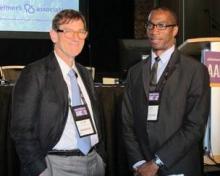VANCOUVER, B.C. – An online community-wide healthy aging program has increased cognitive screening in physicians’ offices by 50% in 18 months, targeting the population so well that half of participants show cognitive impairment when clinically evaluated.
Since the Orange County (Calif.) Vital Aging Program debuted in September 2010, it has linked more than 6,000 residents to physicians for cognitive assessments – an average of 400 evaluations per month, Dr. William Shankle said at the Alzheimer’s Association International Conference 2012.
“Many people with cognitive impairment or early dementia are not seeing a physician, and for various reasons,” said Dr. Shankle, director of the memory and cognitive disorders unit at Hoag Neurosciences Institute in Newport Beach, Calif. “Most don’t think cognitive impairment is treatable, and most associate memory loss with Alzheimer’s disease.”
That association provokes a deep fear, putting many in a state of denial and dampening their desire to reach out to physicians. The ability to self-screen online with a survey based on clinically validated questions can ease that fear – about half of those who take the survey discover that their memory problems are simply the result of normal aging. For the other half, the self-assessment suggests that a formal evaluation can get them the help they need to deal proactively with a cognitive problem, Dr. Shankle said.
If a screen comes back positive, residents can search the Vital Aging website for a physician close to them who has the special training to help. The program also reaches out to the greater community of those without memory concerns. Visitors can explore educational links, sign up for a monthly newsletter, and find out about public lectures focusing on brain health and lifestyle changes that can optimize it.
In fact, a preliminary assessment shows that people who take the memory evaluation, attend a lecture, and then follow through with the suggested changes perform better on memory tests at a follow-up assessment 1 year later.
“We’ve seen that 75% of people who attend these lectures do go back to their doctors for a 1-year follow-up visit, which is great,” Dr. Shankle said. “Participants are very willing to educate themselves, make these positive lifestyle changes, and manage the risk factors that can influence their cognitive health.” For physicians, the program provides a portal to specially focused continuing medical education, he said. “These CME activities are differentiated to dig down to the individual physician’s level of knowledge and start there, or to provide more advanced training to those who already have knowledge of the issues.”
Community programs like these are one way to help manage the money pit that is dementia care. “Dementia costs a lot of money. On average, Medicare pays three times more per year to care for a dementia patient than a patient who doesn’t have it.
This creates an urgent need to address cognitive health care in a community – or this will bankrupt medical care. We have a system that is broken. This is one way to begin to fix it,” he said. Dr. Shankle disclosed that he is an employee of and holds stock in Medical Care Corp., which supplied some of the technology used in the Orange County Vital Aging Project.


